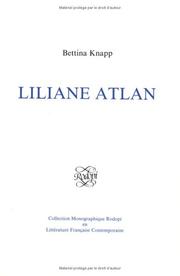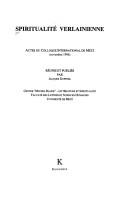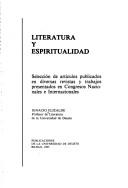| Listing 1 - 10 of 107 | << page >> |
Sort by
|
Book
ISBN: 2226188541 9782226188540 Year: 2010 Publisher: Paris: Albin Michel,
Abstract | Keywords | Export | Availability | Bookmark
 Loading...
Loading...Choose an application
- Reference Manager
- EndNote
- RefWorks (Direct export to RefWorks)
Book
Year: 2020 Publisher: Stockholm : Stockholm University Press,
Abstract | Keywords | Export | Availability | Bookmark
 Loading...
Loading...Choose an application
- Reference Manager
- EndNote
- RefWorks (Direct export to RefWorks)
"By invoking Flora Nwapa, this monograph draws attention to Nigerian women writers in world literature, with an emphasis on femininity and spirituality. Flora Nwapa's Efuru (1966) was the first internationally published novel in English by a female African writer. With the establishment of Tana Press in 1977, Flora Nwapa also became the first female publisher in Africa. Although Flora Nwapa has been recognized as the 'mother of modern African literature', she is not sufficiently acknowledged in world literary canons or world literature studies, which is something this monograph aspires to redress, with the help of earlier studies, especially Nigerian scholarship. Drawing on the Efuru@50 celebration in Nigeria in 2016, this book explores the revival of Flora Nwapa's fame as the pioneer of African women's literature. Using an ethnographic rather than biographical approach, it captures Flora Nwapa's literary practice in the context of the Nigerian literary scene and its interlinkages with world literature. The ethnographic portrayal of Flora Nwapa is complemented with an exposé of a select number of contemporary Nigerian women writers, based on interviews during fieldwork in Nigeria. The book uses concepts like creolized aesthetics and womanist worldmaking to advance scholarly understandings of world literature, which is conceived here as a pluriverse of aesthetic worlds. Exploring experimental ethnographic writing, the book combines the genres of creative non-fiction, descriptive ethnography and scholarly analysis, in an effort to make the text more accessible to academic as well as non-academic readers. Through travel notes the experience of fieldwork is shared in a candid manner. Detailed ethnography from the Efuru@50 literary festival is presented to show the expansion of Flora Nwapa's fame. In-depth analyses of Flora Nwapa's literary works and the cultural context of her literary practice cover a wide range of themes, from feminine storytelling and children's literature, to publishing and digitalization. The theoretical discussion draws on anthropological, literary and African womanist theory to contextualize and explore the central themes of femininity and spirituality in world literature. Inspired by the social change perspective of African womanism and critical decolonial theory, the book makes a contribution to current efforts to explore a more socially just and environmentally sustainable world of many worlds. Paying close attention to gender complementarity and sacred engagements in Flora Nwapa's literary worldmaking, it shows how world literature can help us create other possible worlds of human, spiritual and environmental coexistence."

ISBN: 9004647740 9062038271 Year: 1988 Publisher: Amsterdam : BRILL,
Abstract | Keywords | Export | Availability | Bookmark
 Loading...
Loading...Choose an application
- Reference Manager
- EndNote
- RefWorks (Direct export to RefWorks)
Book
Year: 2020 Publisher: Stockholm : Stockholm University Press,
Abstract | Keywords | Export | Availability | Bookmark
 Loading...
Loading...Choose an application
- Reference Manager
- EndNote
- RefWorks (Direct export to RefWorks)
"By invoking Flora Nwapa, this monograph draws attention to Nigerian women writers in world literature, with an emphasis on femininity and spirituality. Flora Nwapa's Efuru (1966) was the first internationally published novel in English by a female African writer. With the establishment of Tana Press in 1977, Flora Nwapa also became the first female publisher in Africa. Although Flora Nwapa has been recognized as the 'mother of modern African literature', she is not sufficiently acknowledged in world literary canons or world literature studies, which is something this monograph aspires to redress, with the help of earlier studies, especially Nigerian scholarship. Drawing on the Efuru@50 celebration in Nigeria in 2016, this book explores the revival of Flora Nwapa's fame as the pioneer of African women's literature. Using an ethnographic rather than biographical approach, it captures Flora Nwapa's literary practice in the context of the Nigerian literary scene and its interlinkages with world literature. The ethnographic portrayal of Flora Nwapa is complemented with an exposé of a select number of contemporary Nigerian women writers, based on interviews during fieldwork in Nigeria. The book uses concepts like creolized aesthetics and womanist worldmaking to advance scholarly understandings of world literature, which is conceived here as a pluriverse of aesthetic worlds. Exploring experimental ethnographic writing, the book combines the genres of creative non-fiction, descriptive ethnography and scholarly analysis, in an effort to make the text more accessible to academic as well as non-academic readers. Through travel notes the experience of fieldwork is shared in a candid manner. Detailed ethnography from the Efuru@50 literary festival is presented to show the expansion of Flora Nwapa's fame. In-depth analyses of Flora Nwapa's literary works and the cultural context of her literary practice cover a wide range of themes, from feminine storytelling and children's literature, to publishing and digitalization. The theoretical discussion draws on anthropological, literary and African womanist theory to contextualize and explore the central themes of femininity and spirituality in world literature. Inspired by the social change perspective of African womanism and critical decolonial theory, the book makes a contribution to current efforts to explore a more socially just and environmentally sustainable world of many worlds. Paying close attention to gender complementarity and sacred engagements in Flora Nwapa's literary worldmaking, it shows how world literature can help us create other possible worlds of human, spiritual and environmental coexistence."

ISBN: 2252031719 9782252031711 Year: 1997 Volume: 54 Publisher: Paris: Klincksieck,
Abstract | Keywords | Export | Availability | Bookmark
 Loading...
Loading...Choose an application
- Reference Manager
- EndNote
- RefWorks (Direct export to RefWorks)
Book
ISSN: 14244802 ISBN: 1299411274 3035200149 Year: 2010 Volume: v. 17 Publisher: Bern ; New York : Peter Lang,
Abstract | Keywords | Export | Availability | Bookmark
 Loading...
Loading...Choose an application
- Reference Manager
- EndNote
- RefWorks (Direct export to RefWorks)
Cet ouvrage, partiellement issu de réflexions engagées lors du colloque interdisciplinaire « Textes sacrés, Arts et Sciences » (dirigé par Mélanie Adda, INHA, Paris, 11-12 janvier 2008), traite dans une double perspective de la relation entre les textes sacrés et la culture profane qui s'y rapporte ou qui s'y heurte. Les auteurs se sont d'abord interrogés sur la possibilité d'une définition en intension de la sacralité textuelle. En observant le devenir de critères propre à la définir (comme l'origine divine) dans des contextes aussi différents que le judaïsme hellénistique, le Moyen Âge chrétien ou encore le confucianisme, les études de ce volume mettent en lumière la complexité de la notion de texte sacré, qui ne peut sans doute recevoir d'autre définition qu'en extension. L'autre objectif de ce recueil est d'étudier la réception des textes sacrés dans les civilisations et les cultures profanes dont ils sont les principaux fondements, en observant non seulement le statut que l'objet profane reconnaît au texte sacré auquel il emprunte, se consacre ou s'oppose, mais aussi le statut que ce même objet profane s'attribue alors à lui-même ou se voit attribuer. Ce double aspect de la réception du texte sacré est étudié à travers diverses productions culturelles, des plus directement liées à la source sacrée - comme les apocryphes, les traductions, l'exégèse et les enluminures -, aux plus indépendantes - comme la création littéraire -, en passant par celles qui, comme certaines sciences positives, doivent contourner le texte sacré, ou encore celles qui le détournent à des fins polémiques ou politiques. «[T]his is an invaluable way into French reception criticism for biblical scholars [...].» (John F.A. Sawyer, Relegere: Studies in Religion and Reception)
Book
ISBN: 9781620558157 1620558157 Year: 2018 Publisher: New York : Inner Traditions International, Limited,
Abstract | Keywords | Export | Availability | Bookmark
 Loading...
Loading...Choose an application
- Reference Manager
- EndNote
- RefWorks (Direct export to RefWorks)
"Original tales inspired by Native American and Norwegian folklore that highlight the wisdom of the divine natural world"--
Mind and body. --- Spirituality. --- Spirituality in literature.
Book
ISBN: 9781800643222 9781800643239 9781800643246 9781800643253 Year: 2021 Publisher: Cambridge : Open Book Publishers,
Abstract | Keywords | Export | Availability | Bookmark
 Loading...
Loading...Choose an application
- Reference Manager
- EndNote
- RefWorks (Direct export to RefWorks)
Shedding fresh light on the life and work of William Butler Yeats--widely acclaimed as the major English-language poet of the twentieth century--this new study by leading scholar Patrick J. Keane questions established understandings of the Irish poet's long fascination with the occult: a fixation that repelled literary contemporaries T.S. Eliot and W.H. Auden, but which enhanced Yeats's vision of life and death.

ISBN: 8474850401 Year: 1983 Publisher: Bilbao
Abstract | Keywords | Export | Availability | Bookmark
 Loading...
Loading...Choose an application
- Reference Manager
- EndNote
- RefWorks (Direct export to RefWorks)
Spanish literature --- Spirituality in literature. --- History and criticism.
Book
ISBN: 9782252030677 2252030674 Year: 1996 Publisher: Metz: Université de Metz. Centre Michel Baude Littérature et spiritualité,
Abstract | Keywords | Export | Availability | Bookmark
 Loading...
Loading...Choose an application
- Reference Manager
- EndNote
- RefWorks (Direct export to RefWorks)
French literature --- Classicism in literature. --- Spirituality in literature. --- Hennequin, Jacques
| Listing 1 - 10 of 107 | << page >> |
Sort by
|

 Search
Search Feedback
Feedback About UniCat
About UniCat  Help
Help News
News